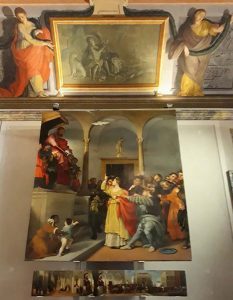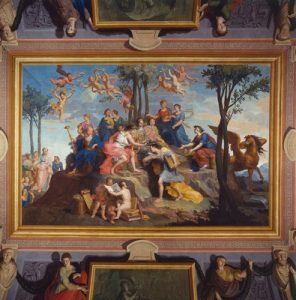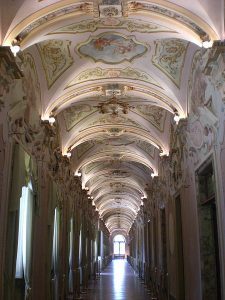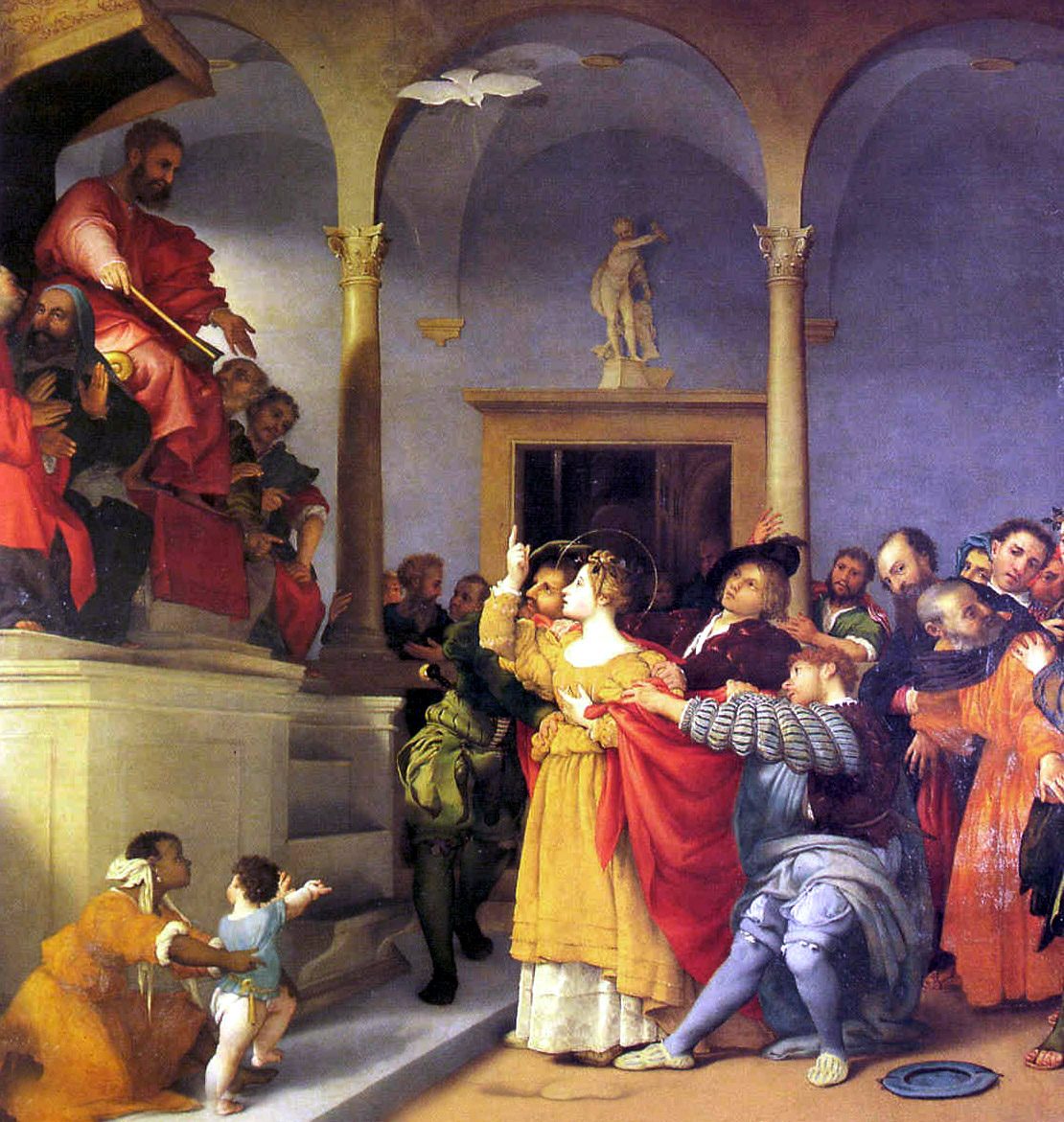{:en}It is one of the most beautiful works painted by Lorenzo Lotto, the Santa Lucia Altarpiece preserved in the Jesi civic art gallery in Palazzo Pianetti, commissioned in 1523 by the confraternity of Santa Lucia, the richest in the city, which managed the hospital next to the church of San Floriano. After a long gestation, perhaps due to the difficulty of being paid, Lotto was always short of money, the panel was delivered, that is, nine years later, in 1532.
Little is known about him and his life as a boy, he was born in Venice around 1480, apparently from a merchant family.

But what can be imagined is the context of that period, we are in the midst of the Renaissance, in a wide-ranging and perhaps unrepeatable cultural fervor, the city lives on the glories of the Serenissima, enjoys the proceeds of its rich trade and Constantinople has fallen thirty years, delivering to the city many precious texts in Greek that Aldo Manutius took care of reprinting. Everything speaks Greek. But it is also the Venice of Bellini and Giorgione, of Titian and Sansovino. In a similar context, for an authentic Venetian like Lorenzo, perhaps the city is a little too crowded, unlike painters who come from the mountains like Titian or from the countryside like Giorgione who remain electrified by that culturally rich climate, perhaps Lotto of Venice he's up to his hair. And so he emigrates. It has been said of him that he was saturnine and melancholic, that he was not attached to money and power like Titian, who opposed him in every way: “O Lotto, like goodness good, and like virtue virtuous…. “Aretino wrote on his behalf.

Can we think that Lorenzo Lotto instead felt superior to this sort of earthly vanity? Was he an anarchist ante litteram? Perhaps it was precisely his lack of means that led to his gloom and melancholy...: "alone, without government trust, and very restless of mind", he wrote at a certain point in his life. Probably the only thing that really mattered to him was his painting. A man always on the run from himself, yet not at all simple as Vasari describes him, he was just someone who messed up the cards, which is never a good way to be successful.
When you look at the Lotto Altarpiece you cannot help but notice Lucia and her finger pointing to the sky, she seems like someone who knows a lot and also wants to tell it. She is a woman who argues, Lucia / Lux illuminated by the light and therefore divine, that she tells Pascasio how he thinks. Paschasius is Diocletian's Roman proconsul, certainly not a tolerant emperor. Lucia, who spoke about her to her mother who was afflicted by an illness and then healed thanks to her faith towards Saint Agatha, decides that she will not marry, she will remain a virgin and she will leave her assets to the poor. And this, for the Roman, familial and patriarchal power, is after all the true sacrilege. It has been said that the Christians of the first centuries after Christ were persecuted because their language was revolutionary: they gave space to the last, to women and the poor. It was only later, when Christianity became dogma, became patriarchal and familial, that Constantine accepted it as the religion of the Empire.
Lucia is still the threat to the established power, she who won't be moved even by thirteen oxen to which she will be tied to be taken to the brothel, she teaches us that when we believe in something nothing and no one should affect us. What is Lucia's sanctity, then, if not her resolve? The divine ray that descends upon us when we don't even know where certain strength comes from. The man who looks at us, the only one in this lively gallery of characters, seems to invite us to enter the scene but not only that, he seems to want our opinion, he has a look of "and what do you think?", in his vaguely smile ironic and detached, as a truly otherworldly element of the context. Is it Lorenzo himself who asks?
Because Lorenzo must have asked many questions throughout his life, hence his reputation as a restless man. Perhaps he didn't even find many people to interface with and he was certainly looking for in the Marche region that serenity of soul that its beautiful landscape arouses even now and where he found that simplicity in human relationships, a spontaneity and truth in faith that neither Rome nor Venice was capable of provide him.
He was very interested in astronomy/astrology and alchemy. He was a Neoplatonist, like many artists and writers of the time, and this does not make him such a pious and devout man as he was clumsily "painted".
It also remains to underline that in the XNUMXth century there was a real revaluation of the female figure, which in Baldassar Castiglione's The Courtier takes the floor and stimulates discussion and reasoning.

A Lucia to visit and contemplate, in the beautiful setting of that Pianetti gallery in Palazzo Pianetti in Jesi, which due to its beauty is also called the
” little Versailles”.{:}{:en}
Lorenzo Lotto, visionary genius
One of the most beautiful paintings by Lorenzo Lotto, “Pala di Santa Lucia” at the Pinacoteca Civica of Palazzo Pianetti in Jesi, commissioned in 1523 by the Confraternity of Saint Lucy, the richest of the city, that managed the hospital close to the church of Saint Floriano. Development of the painting took a long time, perhaps for difficulties in being paid, Lotto was always in shortage of money, the painting was finished in 1532, i.e. nine years later.

Little information we have about the painter and his childhood, he was born in Venice around 1480 probably from a merchant family.
You can imagine the context of that period, in the middle of the Renaissance, in a widespread cultural and perhaps unrepeatable fervor, the city becomes the “Serenissima”, enjoys the profits of its rich trades while Constantinople had lost its importance thirty years before, delivering to the city many precious Greek texts that Aldo Manutius will reprint. Everything speaks Greek. But it is also the Venice of Bellini and Giorgione, of Titian and Sansovino. In a similar context, for a true Venetian – like Lorenzo Lotto was – perhaps the city is a little too crowded, unlike painters coming from the mountains like Titian or from the countryside like Giorgione, who remain electrified by that culturally rich climate, perhaps Lotto is fed up with Venice. And I know he emigrates. He was described as saturnine and melancholic, he was not attached to money and power as Titian was, who opposed him in every way: “O Lotto, as good as goodness, and as virtuous as virtue…” Titian wrote on his behalf about him .
You may think that Lorenzo Lotto felt superior to this kind of earthly vanity. Was he maybe an anarchist “ante litteram”? Perhaps it was his scarcity of him means to bring him into curiosity and melancholy, “alone, without faithful government, and very restless about the mind”, he wrote at some point in his life. Probably, painting was the only thing that really mattered to him. A man always escaping from himself, though not as simple as Vasari describes, he was just one who disagreed cards, which is never a good road to success.

When you look at the Lotto's “Pala di Santa Lucia” you definitely notice Lucy and her finger pointing to the sky, it looks like she knows way too many things and she is also able to tell them. She is a woman that debates, Lucia/Lux enlightened by light and therefore divine, who tells Pascasio what she thinks. Paschasius is the Roman proconsul of Diocletian, certainly not a tolerant emperor. Lucy, who spoke with her mother di lei afflicted by a disease and then healed thanks to her faith di lei in Saint Agata, decides she will not marry, will remain virgin and will leave her possessions to the poor. And this is a true sacrilege to Roman familistic and patriarchal power. Christians of the first centuries were persecuted because their language was revolutionary: they gave way to poor, to women and to the “last”. It was only afterwards that, when Christianity became a dogma, it became patriarchal and familistic, so that Constantine accepted it as religion of the Empire.
Lucy is still a threat to the constituted power, she is the one who did not get hurt by thirteen oxen to which she was bound and led to the Lupanar. She teaches us that if you believe in something, then nobody can damage your belief. Isn't Lucy's holiness nothing more than her determination? The divine ray that comes down to us when we do not even know where it comes from. The man who looks at us, the only one in this moving gallery of characters, seems inviting us to enter the scene, but also it seems he's asking for our opinion, “what do you think about it?”, in his vaguely ironic smile and distant, a real celestial element of the context. Is Lorenzo himself asking?
In his life Lorenzo probably asked himself many questions, hence his reputation of being a restless man. Perhaps he did not find many people to communicate and certainly, he was looking for quietness in the Marche region, a peace of mind that the stunning landscape of the Marche was raising and still does. There he could find simplicity of human relationships, spontaneous and true faith that he could not certainly find in Rome nor Venice.
He was very interested in astronomy / astrology and alchemy. He was a neoplatonic, like many artists and writers of the time, and this does not make him such a pious and devoted man as he was dreadfully “painted”. It should also be emphasized that in the Sixteenth century a real re-evaluation of the female figure was taking place, who speaks in the “Book of the Courtier” of Baldassare Castiglione and stimulates discussion and reasoning.

Lucy deserves a visit and contemplation, in the beautiful setting of Galleria Pianetti at Palazzo Pianetti in Jesi, which for its beauty is also called the “little Versailles”.
{:}

